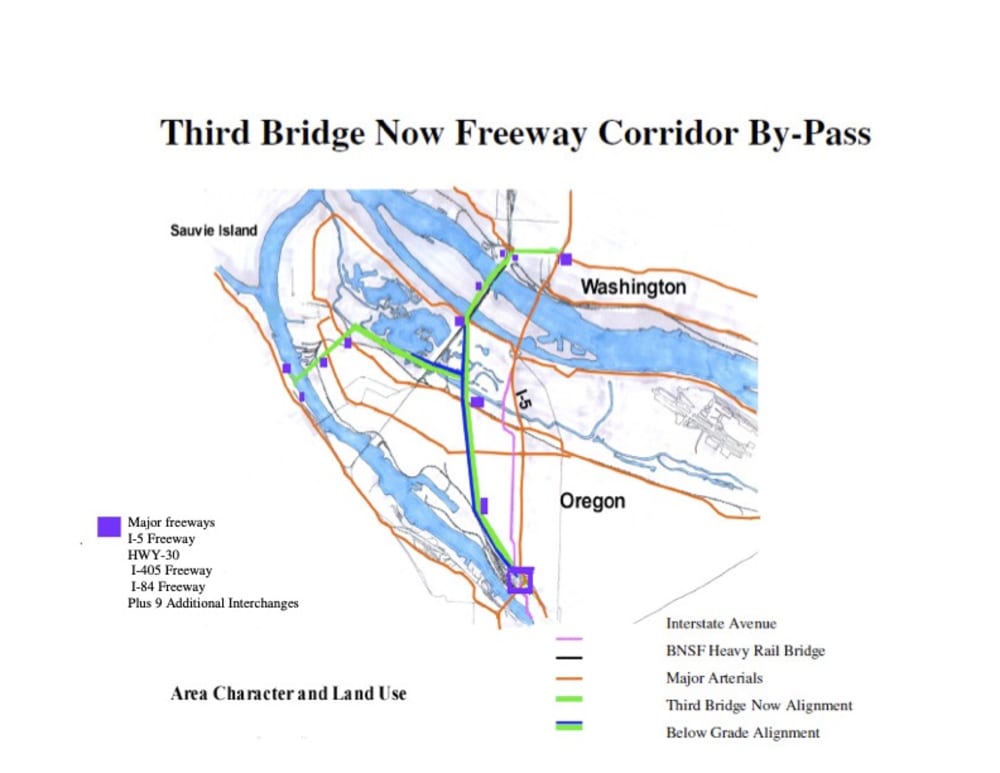Third Bridge Now Freeway Corridor Is Necessary For Our Health, Safety, Economy, Environment, And Sanity
The 2002 transportation study concerning Portland / Vancouver pointed out that with have fewer bridges than similar size metropolitans. The study showed adding two bridges would still tie us for last place. The need to add capacity vehicle, pedestrian, and freight trains across the Columbia River has been identified and adopted into state and regional transportation plans since the 1960’s.
In the 1980’s the I-5 freeway through Portland to the Columbia River was identified as over-capacity, rated F, tens of thousands of vehicles daily using neighborhood streets adjacent to I-5 to reach the bridges over the Columbia.
In 2002 both transportation studies included in their recommendations a new bridge adjacent the BNSF rail bridge a port to port connection for significant north, south, east, west movement of people, goods, and services. Data showed our earlier alternative a miner arterial carrying 48,000 vehicles was full upon opening and over 42,000 vehicles that were driving 6-miles each way out to I-205 returned to I-5 freeway the number one destination. That arterial removed 11 to 15 – million vehicles annually from driving the extra miles on I-84 and east-west arterials in Portland and Vancouver between I-5 and I-205 freeway.
2005 the updated electrical and inspection report on the Columbia River Crossings (I-5) gave 60 years of serviceable lift and no restrictions. The bridges are on the Federal Register for Historical Significance in engineering.
The community supported and awards winning, Third Bridge Now freeway corridor. The construction of a bi-pass freeway loop connecting I-5 freeway in the Northern and Southern terminus with connections to ports and industrial areas. The multi –modal freeway corridor removes several freight and hazardous material routes from neighborhoods in both Portland and Vancouver while providing direct freeway accesses to industrial areas.
The majority of the land is vacant, publicly owned and inside of industrial areas. The new construction does not cause additional construction congestion. The three bridges can be constructed in a controlled environment barged into place protecting fish, and community from location construction. After crossing the Columbia River trenching and tunneling removes conflicts with heavy rail, street grade, and neighborhoods plus new technologies and collections emissions.
Multi-modal includes pedestrian, bike, small engine (PBSE) and the freeway. The first in the nation to a have a freeway corridor that provide PBSE between two major downtown’s, into ports and industrial areas, from residential areas, and connects the 40-mile loop for recreation. The project includes 2- tracks heavy rail commuter and freight from Longview WA to the Rose Quarter in Portland.
Businesses loose billions of dollars annually because of congestion in our region. The project includes upgrades on I-5, I-5 and I-84 realignment and two other port bridge crossing the Columbia River. No tolls instead impact infrastructure fees on land for direct freeway access to the ports and industrials areas.
The time to choose a project is now please help us!
Third Bridge Now
https://www.youtube.com/watch?v=vMImfyT1iEA
Like this entry?
-
About the Entrant
- Name:Sharon Nasset
- Type of entry:individual
- Software used for this entry:no
- Patent status:none


